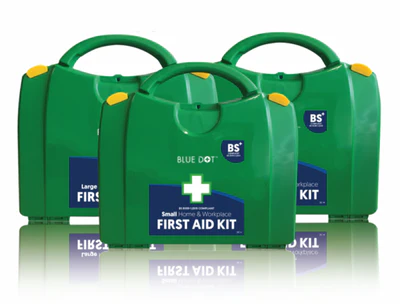
What are the latest BSI first aid kit standards?
The standards set out for first aid kits are curated by the British Standards Institute (BSI). The body publishes new and updated standards on a regular basis for a wide range of sectors beyond just health and safety. But what does it mean when a standard is withdrawn and revised?
Firstly, it is important to note that British Standards are not law. But that’s not to say that they should be taken lightly.
When it comes to workplace safety, it is the legal duty of employers to assess the risks of the workplace environment and supply appropriate first aid equipment and personal protective equipment (PPE) accordingly.
The BSI standard first aid kits act as a good benchmark for businesses to assemble the most essential items.
First aid kits can evolve significantly as checklists get revised, something which happens on a regular basis.
What’s changed?
The BSI introduced its latest standard, the BS 8599-1:2019 compliant first aid kit, a little over a year ago.
There were a number of notable changes this time around, not just in terms of adjustments to the items and quantities required, but it also saw the launch of two brand new kits.
Here’s a look at the items found within the most recent BSI standard first aid kits and how they differ from previous, withdrawn editions.
Home and workplace first aid kit
These are the most common first aid kits on the market and carry commonly found items such as plasters, bandages, and disposable gloves. The latest standard has introduced three amended kit sizes: small, medium, and large.
The size required is determined by the number of employees in the workplace and the extent of the hazards posed throughout the environment. BSI advises the following in terms of appropriate size and quantities.
Low hazard workplaces (shops, offices, etc)
- Less than 25 employees: one small first aid kit
- 25-100 employees: one medium first aid kit
- More than 100 employees: one large first aid kit per 100 employees
High hazard workplaces (assembly work, food processing, etc)
- Less than 5 employees: one small first aid kit
- 5-25 employees: one medium first aid kit
- More than 25 employees: one large first aid kit per 25 employees
The brand new kits
BSI unveiled a revised kit specifically for travel and motoring. This brings together what was formerly two separate kits into one comprehensive alternative.
There are also two new supplementary kits: a personal issue kit (for lone workers) and a critical injury pack.
The personal issue kit has been designed for lone workers who may need to treat themselves while out on location. More serious and life-threatening situations have been considered with the critical injury pack. This contains items that treat heavy traumas and bleeds, such as tourniquets and haemostatic dressings.
What happens to old standards?
Withdrawn standards still have their uses. For example, they can serve as important reference documents. It’s also better to have first aid equipment that meets an old standard than to be lacking any whatsoever, providing the items are fit for purpose. That being said, it is highly recommended that you update to the current standards.
A comprehensive library of withdrawn standards is maintained digitally by BSI. They are available from the body via request.
Don’t forget that there are many uncommon first aid items that are not included in the BSI checklist of essentials. Read our guide on these often overlooked items here. Among those featured are safety pins, an item that as of 2019 is no longer a requirement of the BSI standard.
At First Aid Warehouse we stock a range of new BSI compliant first aid kits of all sizes for the workplace, catering industry, motoring and travelling. You’ll also find first aid refill packs that are ideal for ensuring you’re regularly replenishing the items you need. We also offer discounts on bulk and repeat orders. Contact us for details.